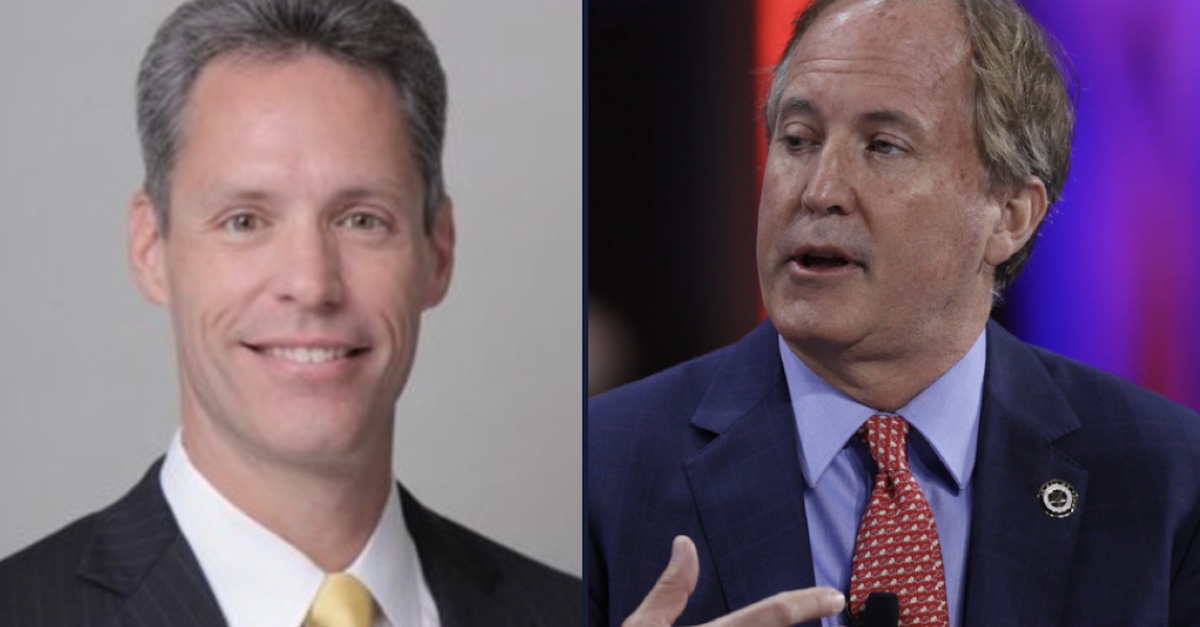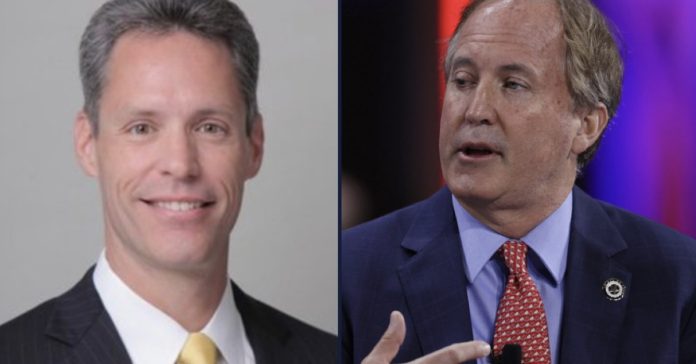
U.S. District Judge Drew Tipton (L) (U.S. District Court for the Southern District of Texas), Ken Paxton (R) (via Joe Raedle/Getty Images)
In a significant move by the policymaking body of the federal court system, the Judicial Conference of the United States announced Tuesday that it was taking steps to curb the kind of “judge shopping” aimed at obtaining sweeping injunctions from friendly one-judge divisions on major issues.
Although the announcement suggested years-old bipartisan worries of rampant “judge shopping” in patent cases was what first shined a light on the issue, the Court Administration and Case Management Committee later uncovered that such legal gamesmanship was affecting the federal civil courts more broadly, whether in bankruptcy proceedings or otherwise.
Specifically, the Judicial Conference wants to prevent litigants from bring civil cases to judges they believe will sign off on requests for declaratory judgments “and/or any form of injunctive relief” no matter how sweeping. In other words, case assignments on such matters must actually be randomly determined from a pool of judges in a district, likely meaning that there will be fewer examples of cases heading to the U.S. Supreme Court just to be overturned at a later date.
The issue is that, in Texas for example, while there are numerous judges on a given district court, these districts may also contain divisions where only one judge sits, making what should be a random assignment a certainty in some cases.
The Biden administration’s Department of Justice last March, for instance, accused Texas Attorney General Ken Paxton (R) of “judge shopping” by suing the Department of Homeland Security in the U.S. District Court for Southern District of Texas — but specifically in the Victoria Division, where only U.S. District Judge Drew Tipton presides over civil cases. Tipton, a Donald Trump appointee, was once criticized for making an “unprecedented and outrageous” grant of a nationwide injunction blocking ICE’s enforcement priorities — and SCOTUS went on to overturn that ruling.
Although the court rejected DOJ’s attempt to transfer the case from Tipton’s court, the request said Paxton’s office “admitted” filing in the Victoria Division was no accident.
“The case is being filed in Victoria, quite frankly, Your Honor, because of our experience with you,” the AG’s office told Tipton in court, when explaining why the suit wasn’t filed in Houston, other major metropolitan areas, or in the division along the Southern border.
Next, the DOJ commented directly on the “judge shopping” issue that the Judicial Conference sought to address, noting that more than a dozen cases against the government were filed in divisions where the plaintiffs knew the judge would be “pre-determined”:
That concern is magnified where, as here, Plaintiffs circumvent the random assignment system by never filing in Divisions where they have a non-trivial chance of not knowing what judge they are likely to be assigned. As explained, this is not the first time that Texas has gamed the local rules governing case assignments. In fact, all 28 of the State’s lawsuits against the federal government filed in Texas federal district courts have been filed in just seven Divisions where local rules severely limit the number of judges to whom the cases could be assigned (Victoria, Amarillo, Galveston, Lubbock, Tyler, Fort Worth, Midland), including 18 lawsuits in Divisions where the case would necessarily be assigned to a single, pre-determined judge (Victoria, Amarillo, Galveston, Midland), and no less than seven here in Victoria.
The Biden administration previously raised the same kinds of complaints about “judge shopping” in Amarillo and Lubbock divisions, where U.S. District Judge Matthew Kacsmaryk and U.S. District Judge James Wesley Hendrix sit respectively and hear the overwhelming majority of civil cases, on issues as weighty as abortion pill access or a trillion-dollar government funding bill. Both judges are Trump appointees.
While Ken Paxton’s office previously called the “judge shopping” criticism a “baseless smear,” the Judicial Conference has since endorsed anti-judge shopping policy that will apply to civil cases looking to “bar or mandate state or federal actions, whether by declaratory judgment and/or any form of injunctive relief” — that is, the very kinds of cases that Paxton has tended to file against the Biden administration.
Elura Nanos contributed to this report.
Have a tip we should know? [email protected]

